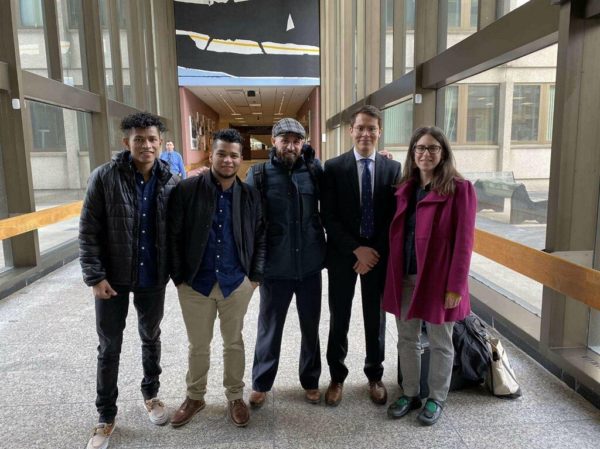
People sometimes ask what motivates HIRC student advocates to work on immigration cases during our busy law school semesters. The answer is simple: our clients. It is impossible to have a bad day after spending time with the asylum-seekers we represent at HIRC. No one embodies this more than Antonio*, a young man who fled El Salvador when he was just a teenager.
From the first time I met Antonio, it was instantly apparent that he was beloved by everyone at HIRC. I learned to build in extra time for our meetings, because Antonio didn’t pass a receptionist, custodian or staff member without stopping to ask about their lives and families. Although Antonio gets up before 6 a.m. to work long days as a cook, his exhausting schedule never dims his smile.
As I got to know Antonio, I learned that his levity and charisma belie an unimaginably difficult past. From a very young age, Antonio was the target of violence and discrimination within his community. Despite Antonio’s tenacity and potential (skilled at computer repair, he was already managing a cyber cafe before his 18th birthday), he was forced to flee his homeland after a violent attack left him afraid for his life.
Antonio arrived in the United States to seek safety, only to be held for months in immigration detention centers. He describes that experience as one of the most difficult of his life. When at last Antonio was given the chance to explain his asylum case to authorities, it was conducted by phone. The records from that call show a truncated interview, marred by translation errors. At one point, the record notes, Antonio was so inconsolable that he could not continue retelling his story. He had never spoken to an attorney.
After passing his interview, Antonio began a nearly seven-year journey through the immigration court system. A combination of factors—from the court backlog, to difficulty finding professional help—can keep people like Antonio trapped in limbo despite the strong merits of their cases.
What’s more, the complexity of asylum cases makes the system nearly impossible to navigate without a lawyer, and challenging even for those with representation. Antonio’s record, for instance, exceeded one thousand pages by the time I joined his case. Fortunately, HIRC student lawyers and attorneys diligently build case files piece-by-piece, like laying bricks in a wall, so that the case remains strong no matter how much time passes.
This January, Antonio at last had his final day in immigration court. For many, confronting Department of Homeland Security (DHS) attorneys, who take on a prosecutorial role, is frightening and dehumanizing. Antonio’s grueling, three-hour questioning by DHS forced him to relive the most traumatic parts of his life.
Fortunately, the judge granted Antonio asylum at the close of the hearing. Antonio described the day as his best day in America. He can now call the United States home and live safely with his brother, who HIRC also helped gain asylum protection. The two are already discussing plans to start a business together.
There are many reasons I am proud to be a part of HIRC. Most of all, I am proud that HIRC transforms a process that can be opaque, degrading, and scary into a tool for empowerment. Antonio and his brother were barely out of high school when they arrived, and both have said that working with HIRC inspired them to be more goal-oriented, mature and and resilient. In turn, Antonio and his brother are an inspiration to all of us at HIRC. Our country is very lucky to welcome them.
*Client’s name has been changed to respect client confidentiality.
This post was written by HIRC clinical student Madeline Kane ’21. Thanks to HIRC staff Sabi Ardalan, Liala Buoniconti and Jason Corral, as well as students Benjamin Antillon Fernandez ’21, Madeline Kane ’21, and Andrew Patterson ’20, for their work on this case.